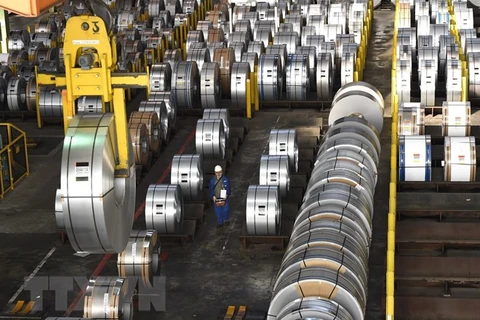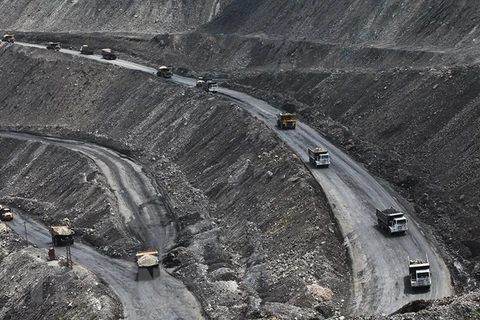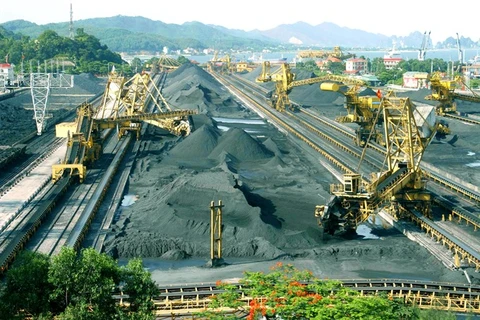 Copper ore extraction at the Sin Quyen-Lao Cai Vimico complex in the northern province of Lao Cai. (Source: VNA )
Copper ore extraction at the Sin Quyen-Lao Cai Vimico complex in the northern province of Lao Cai. (Source: VNA )Hanoi (VNS/VNA) - The Ministry of Finance (MoF) is proposing a sweeping ban on the export of raw minerals, a move that would indicate an escalation of the Government’s generally negative stance on a practice that generates little value while causing environmental devastation.
The proposal was revealed in a recent document the finance ministry sent to the Ministry of Industry and Trade (MoIT) that contains numerous measures to boost State management of mineral resources.
Luu Manh Tuong, Director of the Import and Export Taxation Department, General Department of Vietnam Customs (under the MoF), told Tuoi tre newspaper that the Party and the State have always supported the export of highly processed minerals that carry high added value.
Tuong pointed out that tariffs on many minerals cannot be raised to reduce export because materials such as iron, copper and lead are subject to export taxes as high as 30-40 percent, already reaching the maximum duty level.
“Raising tariffs even more is not appropriate. The remaining viable measure is to implement ‘technical barriers’ but this responsibility rests with the MoIT, outside the jurisdiction of the finance ministry,” he said.
Nguyen Minh Duc from the legal department of the Vietnam Chamber of Commerce and Industry (VCCI) told Tuoi tre (Youth) newspaper the proposed could be in violation of Vietnam’s commitments to the Comprehensive and Progressive Agreement for Trans-Pacific Partnership (CPTPP).
Duc said Vietnam maintains an export tariff on raw minerals during negotiations, but once CPTPP comes into effect Vietnam would have to eliminate them.
“Any measure to limit export of minerals must be carefully studied,” Duc said.
He also said that Vietnam’s tax policies on mineral exports have seen “rapid swings” in recent years. This uncertainty did not encourage long-term investment, giving rise to slapdash short-term mining activities.
“Natural resource management must be based on the three pillars of revenue transparency, selling at the best price and developing the domestic processing industry,” he added.
Other experts on mining said the proposal isn’t new, but the ban has not made it into actual policies because there have not been technical standards for what constitutes “unprocessed”, “processed” or “highly processed” minerals.
Mineral expert Nguyen Thanh Son said there are different levels of processing for raw minerals, and not all of them need to be highly processed. As a result, a uniform policy for all types of minerals is not advisable – each mineral should be considered independently.
“Take bronze for example, which only needs moderate processing to fetch a decent price. On the other hand, the more refined titanium is, the higher price we can get,” Son said.
Tran Van Mien, geology head of the General Department of Geology and Minerals of Vietnam, favours the raw mineral export ban but agreed there should be processing guidelines for some minerals.
“I think the authorities should issue a document which details optimal processing levels, financially speaking,” Mien said. “Of course, there couldn’t be separate regulations for all types of minerals, but it would be a basic management tool to ensure a balance between mineral exploitation, processing and environmental protection.”
Previously, Prime Minister Nguyen Xuan Phuc has ordered limiting small-scale and low-tech mining projects of minerals such as gold, copper, nickel and molybdenum, which “causes pollution and losses to the country’s natural resources.”
He urged the formation of large-scale mining enterprises that make use of advanced technologies – especially new processing and environmental protection techniques.
Recently, mineral export has been on the rise. According to latest reports from the Customs Authority, the country had exported more than two million tonnes of ore by July 15, netting 101 million USD in revenues.
75 percent of the exported ore, totaling 1.5 million tonnes, was sent to China.
Vietnam’s mineral export to China has been criticised lately due to the perception that the selling price is under market value, while the Southeast Asian country still imports a vast amount of minerals from China.
Most of the minerals exported to China are in their raw, unprocessed form, meaning that the relatively minor trade gains they provide are outweighed by the level of ecological damage caused by mining activities.-VNS/VNA
VNA






















